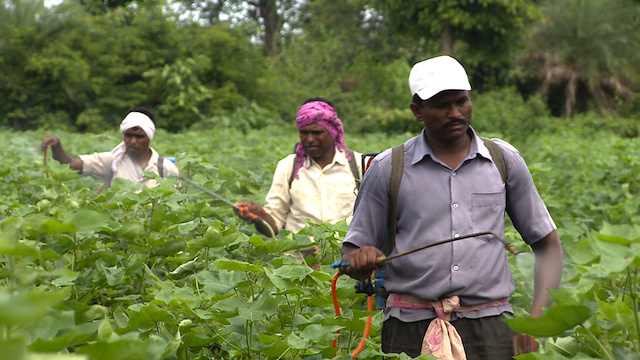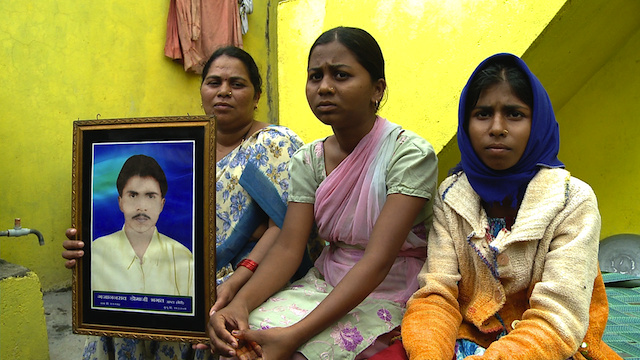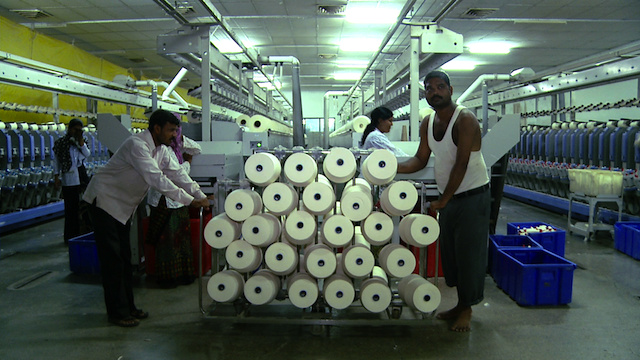Your Clothes Are Making Indian Cotton Farmers Commit Suicide

In the same month that 125 Bangladeshi fabric workers died in a factory fire, a film aiming to expose the tragedy of unrestricted globalized fashion called Dirty White Gold reached its Sponsume target of £18,000 (about $27,000). The film begins by examining the hundreds of thousands of Indian cotton farmers who, saddled with economic hopelessness, have taken their own lives. It's a jolly little piece.
A Center for Human Rights and Global Justice report describes the root of the problem: At the turn of the millennium, Indian farmers who had been given access to a wider range of products after India's market liberalization started buying genetically modified Bollgard Bt cotton seeds from the Gates Foundation-backed Monsanto corporation. The seeds were able to resist and kill the common American Bollworm cotton pest, making them an instant hit, with 85 percent of cotton grown in India being Monsanto-controlled Bt cotton by 2009.
However, the seeds were expensive, and spiralling prices (coupled with planting restrictions from the multinationals selling the seeds) led to farmers approaching money lenders for hefty loans that eventually turned into unmanageable debt. Almost 300,000 cotton workers have committed suicide to date, some of them by drinking the same insecticides they were sold by multinationals. And those suicides also bring up wider questions about the ethics of the fashion industry as a whole, in that this cotton is used in the clothes that end up absolutely everywhere.
India's embrace of the free market opened the floodgates for international money and, perhaps predictably, the corporatization of agriculture vanquished the need for the small-to-medium scale farmers who used to own and control the productive process. For roughly 100 rupees per day (about $1.80), these people are now contracted to spread toxic insecticides and fertilizers, often with little or no protective clothing. I called up the director of Dirty White Gold, London-based journalist Leah Borromeo, to see if the situation could possibly get any more depressing.

Leah Borromeo interviewing Hanuman, an indebted cotton farmer
VICE: Hi, Leah. How far along into the film are you at the
moment?
Leah Borromeo: Some days I feel like I'm a quarter of
the way done, and other days I feel like I'm only an eighth of the way
done. It's going to be out in 2014, toward the end of summer. I've got a
deadline, so I'm trying to get everything done by then, but I can't rush
nature—quite literally, in this case.
What made you want to work on this topic in particular?
I was doing it as a straightforward magazine article, but I ended up
bringing a camera with me and found so many stories within that surface
story. Then I found there was a real, genuine chance to express
globalization, capitalism, consumerism, and all the wider political and
social arguments through the medium of this story.
Yeah, you could look at it as a single issue, but obviously
the problem is vast, and arguably a consequence of global capitalism.
It embodies absolutely everything. Fashion is the one piece of art that
people tend to consume either consciously or unconsciously. The two best
foils for relating to consumerism are through food or fashion. Food is
quite a niche thing, because not everybody eats meat, but everybody—for
the most part—seems to wear clothes.

Prathiba, a widow, with her daughters and a painting of her late
husband
I guess one problem is that people hear about how awful
unethical the practices are, but economic necessity can force them to
shop cheap anyway.
It's using the poor to target the poor, in that sense. It's an obtuse
battlefield if you want to look at it that way. You can fall foul of
targeting those who can't afford to buy into what is now a more ethical
lifestyle. At present, having ethical sustainability or buying into the
idea is very much a preserve of those who can afford it, and that's not
what we're trying to achieve. We want to make it the norm, so that
everyone has no other option but to buy ethically and sustainably. As a
business owner, if you sacrifice a little of your profit, you'll still
be making money, but you'll also be able to ensure that everyone else
down the line gets paid and treated fairly.
Will that ever happen without strict regulation?
Some brands do it voluntarily, but I doubt it would happen unless you
actually legislate for supply-chain transparency across the system.
These days, companies will find themselves with a factory that's caught
fire and killed 161 people, and they'll say, "It was a contractor that
hired them, not us." But if you have to be completely transparent, you
won't be able to absolve yourself of any of those crimes, and you'll
have to be more strict about the people you decide to do business with.

Workers at the Sanskar cotton mill
So it's something they can just hide away at the moment.
Yeah. Look at the horsemeat scandal: it took the attention that got from
the public for Tesco to say, "OK, we're going to source all of our beef
from Great Britain now." There's obviously a gap between what you put
in your body and what you put on your body, but I
don't think it's too much of a psychological gap to bridge. Transparency
is very much on a lot of people's minds; it's only a matter of time
before we start getting transparency for what we wear.
Parts of your film are going to be deeply unsettling. Do you
think those stories will still be relatable for consumers, instead of
just inducing that guilt complex typical of so many documentaries?
Guilt is something I don't necessarily like to play on, but it's
something that's fairly inevitable. I feel guilty; that's one
of the reasons why I decided to do it. I came to realize my own
complicity as a consumer in the deaths and suffering of people lower
down the value chain. And that's one of my primary motivators—not just
to alleviate that, but to make sure other people realize. I know we're
all suffering from the recession and everything else right now, but just
because we're in the shit doesn't mean we have to leave everyone else in
it as well.

A selection of the pesticides used on Indian farms
Ideally, what do you want to achieve with the film?
Official legislation for transparency, but that's not something that can
be an instant quick fix—we're looking at possibly a ten-, 15-, 20-year
scheme. We're looking at long-term goals rather than short-term
gestures. Do we really want to continue feeding our own debt and our own
penury through our consumer habits? It's a state of self-destructive
consumerist behavior and it's something that we can address and change,
but it has to be something that we're willing or made to change.
What are the nonlegislative ways we could introduce that
sooner?
Stuff like getting young designers, as they're coming to schools and
universities, to start working in ethics and sustainability from the
point of concept, so that when they're thinking about the designs
they'll have to think, How is this going to be eco? or, How
is this going to be sustainable?
From an environmental perspective, I guess it's not only
desirable, but necessary.
Yeah. There's a fatalistic aspect of me who thinks we've already done as
much damage as can possibly be done, and we're just delaying the
inevitable, to a certain degree. But there's also the optimist in me who
thinks we're still at a point where grass still grows and trees are
still green, and we can make sure it stays that way.
Thanks, Leah.
Follow Tamlin on Twitter: @wegotblankets